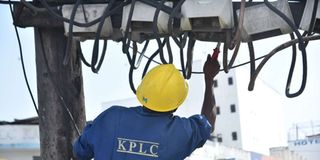Power: Weigh supply, demand

A Kenya Power employee carries out repairs on Haile Selassie Road, Mombasa. Epra has increased the electricity prices three times in four months.
Kenya Power’s proposal to increase electricity prices should be handled on the need for the utility companies to remain profitable to keep providing electricity to drive the economy and, two, the desire for affordable electricity supply.
A World Bank study in 39 countries, “Making power affordable for Africa and viable for its utilities”, listed ways to make power and energy utilities profitable and electricity affordable. It found that one in every three Africans have no access to electricity and resort to kerosene or spend hours in the dark.
Power utilities are cash-strapped and use ageing energy infrastructure; so, they are unable to serve their customers efficiently. More Africans could be without access to electricity by 2030. Then, Kenya—which has the highest access to electricity in East Africa, at 75 per cent of the population—expects to attain 100 per cent access to clean energy.
There is a need to address the twin challenges of financial viability of utilities and making electricity affordable. One, utilities must minimise the inherent technical and commercial power system losses due to activities such as meter tampering. Secondly, power generating companies must ensure maximum collection of electricity bills in an effective manner that incentivises even the consumers.
Thirdly, increasing electricity tariffs is necessary but should target large- and medium-sized consumers while incentivising them to consume more. These are likely to be industry and other manufacturing entities with the capacity to consume more power. There is a strong correlation between electricity consumption and incomes; there can’t be low electricity consumption in a high-income country. There is thus a need to stimulate and encourage more energy consumption to develop the economy.
Fourth, mini- and off-grid electricity connection from solar and wind should be boosted, besides utilisation of the plenteous geothermal energy potential in Kenya. Increased use of clean energy can lower electricity production costs and, hence, tariffs.
Dr Giti, PhD, is an urban management, public-private partnerships (PPPs) and environment specialist. [email protected]. @danielgiti





